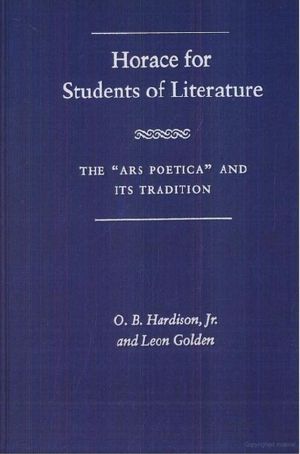Horace for Students of Literature · the Ars Poetica and Its Tradition

- Authors
- Hardison-Jr., O.B. & Golden, Leon
- Publisher
- University Press of Florida
- ISBN
- 9780813013541
- Date
- 1995-06-01T00:00:00+00:00
- Size
- 0.82 MB
- Lang
- en
"Original insights into Horace's influential poem."--George A. Kennedy, Paddison professor of classics and professor of comparative literature, University of North Carolina at Chapel HillThe influence of Horace's Ars Poetica on literary criticism across the ages has sometimes manifested itself in straightforward and direct ways and sometimes in a subtler, more oblique fashion. This volume offers, for the first time, an anthology of important texts, with accompanying commentary, that illustrate this diverse and significant Horatian influence.
The authors demonstrate that what has endured since the first century B.C. in Horace's poetic theory and what has been adapted from it by his successors are themes of permanent value to students of literature and criticism. Using a series of texts--from the Ars Poetica itself to works by Geoffrey of Vinsauf, Nicolas Boileau, Alexander Pope, Lord Byron, and Wallace Stevens (his Notes Toward a Supreme Fiction) --they show that the voice of the Horatian tradition continues to be heard clearly.
In the Ars Poetica Horace maps out three directions followed by the critics represented here: one relates to form and style, another to methods of evaluating success and failure in poetry, while a third investigates the essential purpose of poetic activity and the psychology of the creative artist.
O. B. Hardison, Jr., formerly professor of English at the University of North Carolina, Chapel Hill, and director of the Folger Shakespeare Library, was professor of English at Georgetown University from 1984 until his death in 1990. He was the author or editor of many books, including The Princeton Encyclopedia of Poetry and Poetics; Disappearing Through the Skylight: Culture and Technology in the Twentieth Century (winner of the 1990 Los Angeles Times nonfiction book prize); Prosody and Purpose in the English Renaissance; Medieval Literary Criticism: Translations and Interpretations; and, with Leon Golden, Classical and Medieval Literary Criticism and Aristotle's Poetics: A Translation and Commentary for Students of Literature (UPF, 1981).
Leon Golden is professor of classics and director of the Program in the Humanities at Florida State University. He is also the author of Aristotle on Tragic and Comic Mimesis, In Praise of Prometheus: Humanism and Rationalism in Aeschylean Thought, and numerous articles and book chapters.